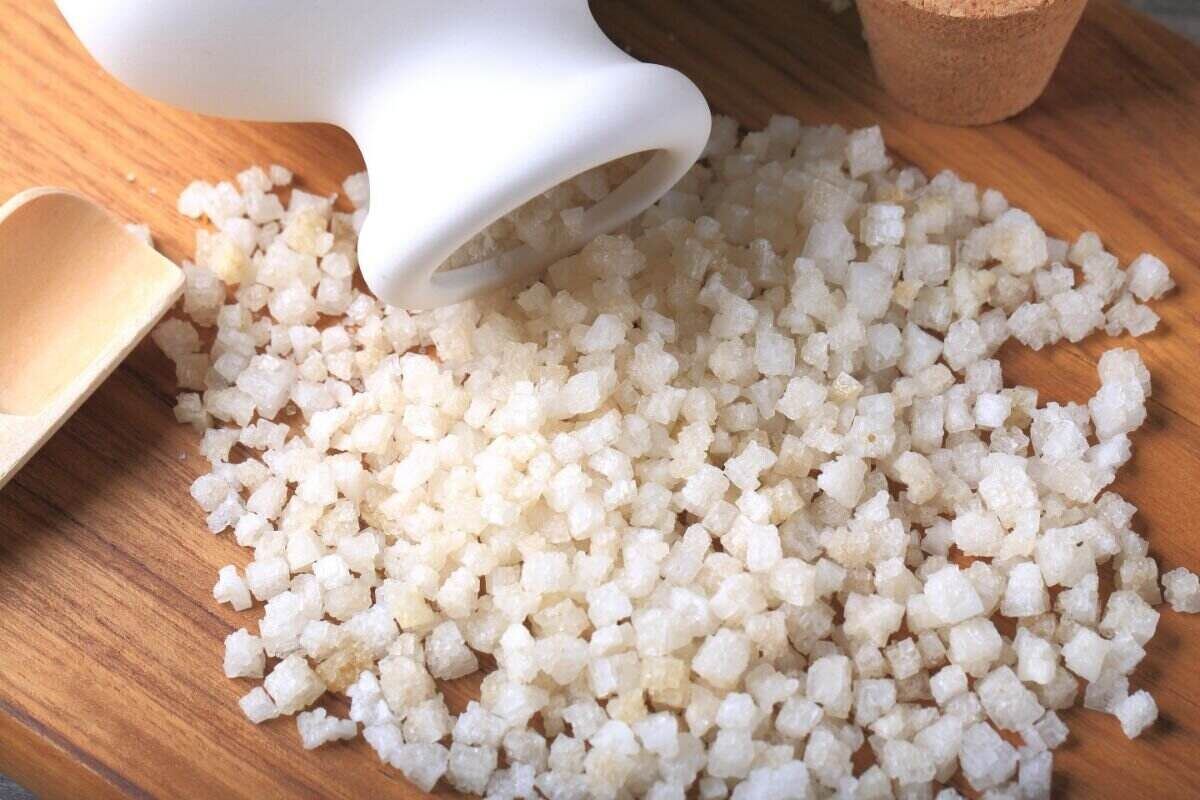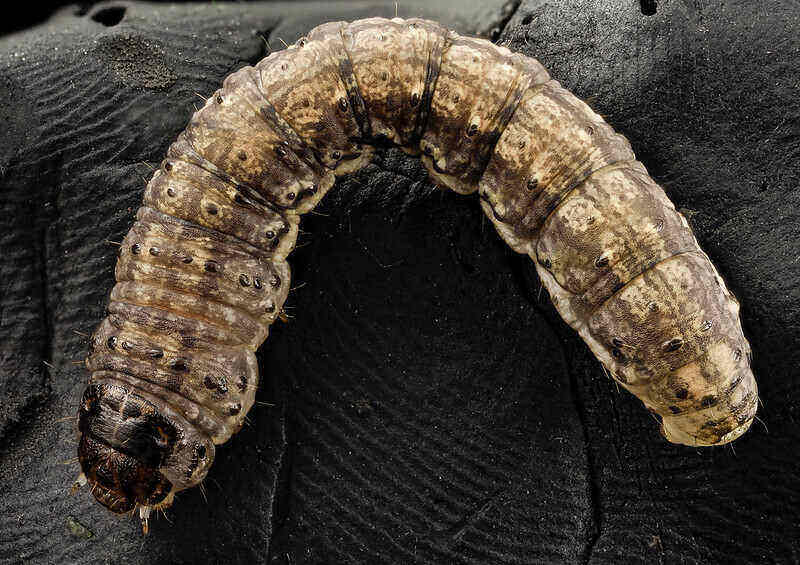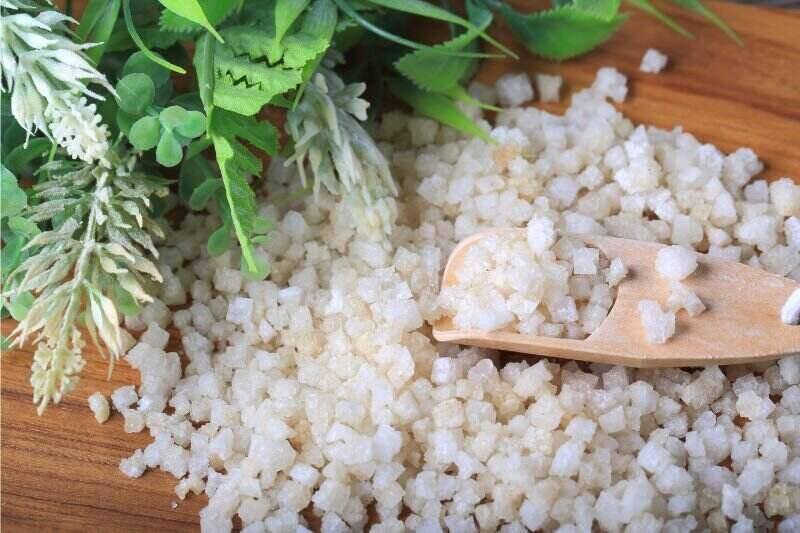
Epsom salt is often touted online as a way to kill soft-bodied lawn and garden pests such as cutworms and other caterpillars. However, Epsom salt is not very effective against cutworms (or other pests, for that matter), and it can harm your plants and grass.
While we do not recommend using Epsom salt as a pest control method for cutworms, it can be done, and some people report successful results. But beware! Before you go spreading salt around your garden, learn more about:
Epsom Salt and Cutworms

Theoretically, Epsom salts are supposed to kill soft-bodied insects, like caterpillars and grubs, by damaging their soft and vulnerable flesh. Cutworms, as a type of moth caterpillar, should be susceptible to this method — if it were true.
However, no scientific evidence supports the notion that Epsom salt can effectively kill cutworms (or any insects) upon contact.
Another common claim is that sprinkling Epsom salt around your plants can deter various lawn and garden pests, including cutworms. However, this claim is also a myth.
- Epsom salts are not consistently effective as pest repellents.
- Using a sufficient amount of Epsom salt to repel pests may harm your grass and plants.
Why Epsom Salt is Bad for Plants
Epsom salt is a compound of magnesium, sulfur, and oxygen. Some people apply it to the lawn or garden if their soil is deficient in magnesium, an essential nutrient for plant growth.
However, adding Epsom salt can cause an excess of magnesium. Too much magnesium in the soil makes it harder for plants to absorb calcium and stunts plant growth. Instead of ending the problem of cutworms, Epsom salt will simply cause a new problem for your lawn and garden.
How to Use Epsom Salt as a Pest Repellent

Despite its inconsistent results as a pest repellent and the possibility of damaging plants, some gardeners can use Epsom salt successfully to repel cutworms, along with other garden pests such as snails and slugs.
You’re welcome to try it for yourself! See the most common methods for using Epsom salt as a pest repellent below:
Dry Epsom Salt: Sprinkle dry Epsom salt in a narrow band around the base of plants. As the dry substance abrades the “skin” of soft-bodied pests, they’ll supposedly dry up and die.
Water and Epsom Salt Solution: Mix 1 cup of Epsom salt in 5 gallons of water and spray it around the affected plants. This solution is touted as both a deterrent and an insecticide (although no scientific evidence supports this claim).
Apply Epsom Salt with Veggies: If you’re planting vegetable seeds and are worried about pests, sprinkle a thin layer of dry Epsom salt directly or alongside the rows. Reapply every couple of weeks to keep hungry bugs away.
Home Remedies for Cutworm Control
Epsom salt isn’t the best DIY solution for a cutworm infestation — not by far. Other insecticides and repellents are more reliable, less risky for your plants, and backed by evidence.
Some natural ways to get rid of cutworms include:
- Diatomaceous earth (DE): Made from fossilized diatoms ground into fine powder, diatomaceous earth is an organic pesticide.
- Bacillus thuringiensis (Bt): An organic insecticide derived from bacteria, it kills cutworm larvae without disrupting other organisms.
- Beneficial nematodes: These nematodes are a biological pest control. They help control cutworm populations without harming other beneficial bugs.
- Spinosad products: A form of organic pest control, these products contain natural insecticides derived from bacteria.
- Baking soda: To deter cutworms, you can sprinkle a thin layer of baking soda around the base of vulnerable plants. Please note that the effectiveness of this method may vary.
- Coffee grounds or eggshells: While this method may work for small populations, no scientific evidence supports its effectiveness.
How to Prevent Cutworm Damage
Preventing cutworm damage in your garden can help ensure the health and vitality of your plants. By implementing these preventive measures, you can minimize the impact of cutworms on your plants and promote a healthy garden environment. Here are some tips to help prevent cutworm damage:
- Crop rotation: Rotate your crops each year to disrupt the life cycle of cutworms and reduce their population.
- Physical barriers: Use collars made from cardboard or aluminum foil around the base of the plant to create a barrier that cutworms cannot crawl over. Toilet paper rolls can protect young plants.
- Tilling: In the fall or early spring, till your garden soil to expose pupae to predators and break down mulch more efficiently.
- Remove debris: Clear away garden debris, such as plant residue and weeds, where cutworms can hide during the day.
- Natural predators: Encourage natural predators of cutworms, such as birds, ground beetles, and parasitic wasps, by creating a diverse and wildlife-friendly garden.
- Handpicking: Inspect your garden regularly and handpick any cutworms you find, disposing of them away from your garden.
FAQ About Using Epsom Salt for Cutworms
Does Epsom Salt Kill Earthworms?
Yes, Epsom salt can be toxic to earthworms in very high doses. It’s best to use a soil test to determine if your garden is magnesium deficient, and only apply Epsom salt if it is. In the long run, your soil will benefit more from a healthy earthworm population than from Epsom salt.
Will Epsom Salt Kill Grub Worms?
It’s not recommended. Neem oil is a good choice as a control method for grubs because it works well as a pesticide and is safe for beneficial insects. To make your own solution, follow the label directions to mix neem oil with water. Apply the solution using a pump or hose-end sprayer during late summer or early fall for the best results.
Can I Apply Epsom Salt Directly To My Soil?
Yes, if the soil has a magnesium deficiency, it’s okay to add Epsom salt directly to the soil. However, excess magnesium can negatively impact plant growth. It’s recommended to conduct a soil test to determine if your soil is deficient in magnesium before applying Epsom salt.
When to Call a Professional
Despite all the buzz on the internet, there is no hard evidence to support the claim that Epsom salt kills or repels cutworms, although some gardeners claim it works for them. At best, it’s a hit-or-miss solution, and better, more reliable methods are available.
Speaking of reliable methods to eliminate lawn pests, LawnStarter can connect you with a trustworthy local lawn care pro who can help with your lawn and garden pest problems. If your landscape faces invaders, contact a pro for help today.
Main Photo Credit: 4nadia / Canva Pro / License